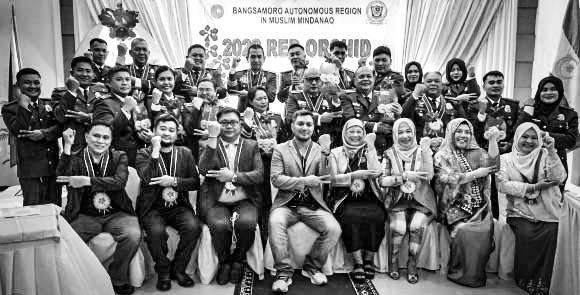
3 minute read
ROTC is good if done right, says military bishop
THE effectiveness of the Reserve Officers Training Corps (ROTC) program in schools depends on implementation and not just ideas, the country’s military bishop said.
Bishop Oscar Jaime Florencio of the Military Ordinariate of the Philippines
Advertisement
(MOP) said he is not entirely against ROTC revival as long as it is for the good of the students.
“The push for the ROTC program would be good if they are implemented well,” Florencio told Radio Veritas.
“The different values that are
Differentcultures have different laws, some of which we may consider weird from our perspective. Here are some: it is illegal to chew gum in Singapore, so don’t bring chewing gum with you; it is illegal to run out of gas in the German Autobhan where there are no speed limits, so gas up before going; it is illegal to feed pigeons in Venice because of too many bird droppings on rooftops, I nearly made this mistake; it is illegal to have selfies with Buddha statues in Sri Lanka, so be careful tourists; if you register as a married couple in a hotel in North Carolina, you become married, so go somewhere else; and many others.
Laws and Traditions
Reflections
Rev. Fr. Antonio P. Pueyo, DCC tonypoy_dcc0@yahoo.com
Laws and traditions are part of human civilization. One of the earliest codified laws discovered were the laws of Hammurabi in Babylon which include laws of commerce, family law, and criminal law. his purpose being, “to make justice visible in the land, to destroy the wicked person and evil-doer, that the strong might not injure the weak.” The laws protect the widows, orphans and the defenseless from being exploited and harmed. Some of his laws may be considered harsh, such as “if anyone knocks out the teeth of his equal, his teeth shall be knocked out” from which comes the “lex talionis” or law of revenge, “ an eye for an eye and a tooth for a tooth.”
Pre-Spanish Philippines also have communities or Baranggays having their own customary (traditiona) and written laws. These laws cover such subjects as inheritance, property rights, family relations, loans, etc, There are also laws that govern criminal offenses, punishable by fines or even death. The more famous of these laws is the Code of Kalantiaw, claimed to be written by Datu Kalantiaw in the 1400’s.
When Jesus commented about the observance of laws and traditions in Israel, he was referring to the Mosaic enshrined in the program could go down to the core of our young people,” he said.
The bishop made the statement amid the ongoing push in the Senate for the return of the ROTC program in tertiary and vocational schools.
The program seeks to provide basic law given by God to Moses or what we now know as the Ten Commandments. There were many other laws in bibilical Israel and some learned Rabbi codified them into 613 laws (Mitzvot). With so many laws there was a need for scribes to remember and interpret the laws. Many of the scribes were also Pharisees. They were the ones who strictly upheld the Jewish traditions, customary as well as written. military training to motivate, train, organize, and utilize students for national defense preparedness or civil-military operations.
In this Sunday’s gospel Jesus was commenting on some of these laws. He did not come to abolish the Law but to bring them into perfection. He wanted to go into the spirit of the law rather than just its letter. Beyond the law of ‘thou shalt not kill” is the deeper sense of “thou shalt not be angry at your brother.” Beyond the law of “thou shalt not commit adultery” is the inner law of, “thou shalt not look at a woman with lust.” Beyond the law “whoever divorces a woman should give her a bill of divorce” is the ideal of fidelity. Beyond the law, “thou shalt not make a false oath,” it is better not to make oaths at all but to be faithful to one’s word and promises, say “yes” when you mean yes, and “no” when you mean no.
For Jesus, laws are made for the well-being of the human person so that, “the Sabbath is made for man and not man for the Sabbath” (Mk. 2:27). There are many kinds of laws: the laws of nature (gravity) which when we break ,make us broken instead; positive laws which are man-made for the sake of order in society, and of course there are the divine laws revealed by God and written in our hearts. Usually, a person of good disposition and upbringing will be guided by his conscience regarding obedience to God’s laws. There are other people with lax and erroneous conscience. This is where good formation and catechesis is important – to develop mature and correct consciences so that God’s laws may be observed not just in its letter but in its spirit.
The ROTC was made optional in 2002 because of reports of corruption within the program. CBCP News
Readings: no. 329, p. 161or no. 528, p. 639
1st Reading: Genesis 1.1-19
Gospel: Mark 6.53-56
Readings: no. 330, p. 164
1st Reading: Genesis 1.20 – 2.4a
Gospel: Mark 7.1-13
Readings: no. 331, p. 167
1st Reading: Genesis 2.4b-9, 15-17
Gospel: Mark 7.14-23
Readings: no. 332, p. 169
1st Reading: Genesis 2.18-25
Gospel: Mark 7.24-30
Readings: no. 332, p. 169
1st Reading: Genesis 2.18-25
Gospel: Mark 7.24-30
Readings: no. 333, p. 171 or no. 530, p. 639
1st Reading: Genesis 3.1-8
Gospel: Mark 7.31-37







